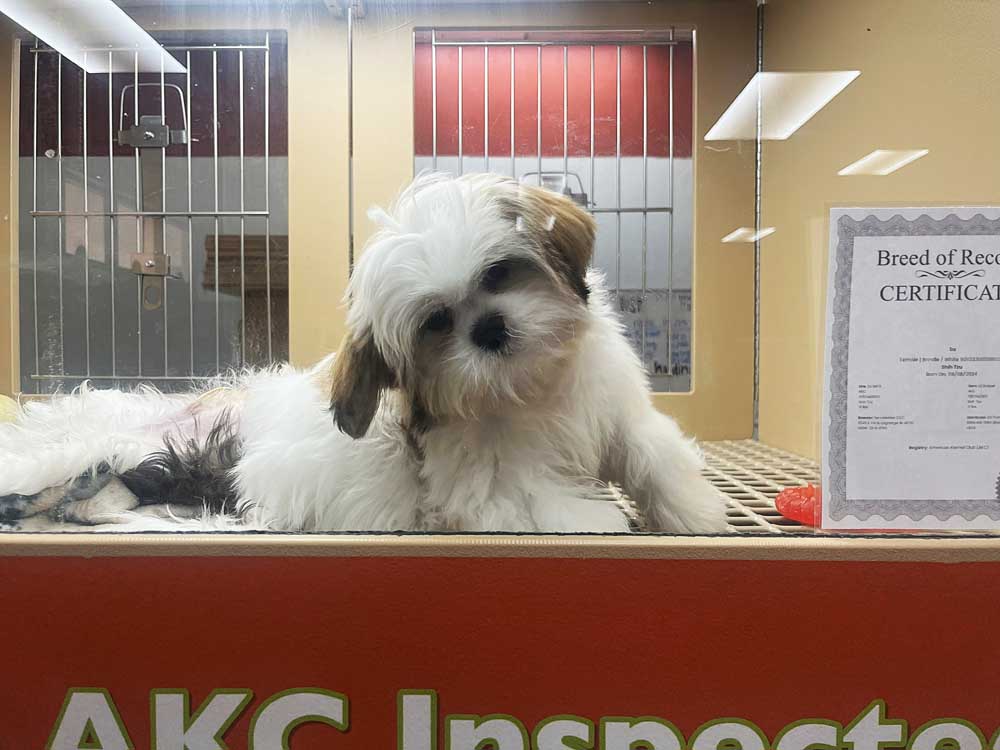Tylerites speak in support of Texas bill that seeks to shut down ‘puppy mill pipeline’
Published 6:30 pm Sunday, March 30, 2025

- According to Petland, all of their puppies come from reputable breeders who undergo inspection by the Department of Agriculture. Former employees allege puppies often arrive sick. (Jennifer Scott/Tyler Morning Telegraph)
A bill in the Texas Legislature aims to crack down on puppy mills, with a goal to bring stricter regulations to an industry criticized by animal advocates. Locally, East Texas advocates hope to see the bill pass.
What are puppy mills?
Trending
Large-scale commercial breeding operations are often referred to as puppy mills, and advocates argue this type of operation prioritizes profit over animal welfare. Dogs are reportedly kept in overcrowded and unsanitary conditions, sometimes even deprived of adequate food, clean water, or veterinary care. Breeding dogs, particularly mothers, produce multiple litters each year. Advocates say these dogs are often abandoned, sold, or euthanized once they are no longer deemed “useful.”
“The puppy mill industry is massive, and it’s driven by profit — often at the expense of the animals,” said Liz Hanna, Tyler resident and animal welfare advocate. “The dogs in these mills don’t experience the kind of life most people associate with having a pet. They don’t sleep on comfy dog beds or run in a big backyard. Instead, they’re confined to small cages, sometimes stacked on top of each other, with waste building up around them.”
These conditions and breeding practices can lead to health and behavioral problems for the dogs born in mills.
What the bill would do
Filed Feb. 26 by Sen. Judith Zaffirini (D-Laredo), Senate Bill 1652, also known as the Ethical Pet Sales Bill, aims to end inhumane breeding and deceptive sales practices. If passed, the bill would take effect on Sept. 1, prohibiting Texas retail pet stores from selling puppies sourced from puppy mills. Instead, they would be required to obtain animals from rescues and shelters.
“‘Ethical pet sales’ refers to stores that do not sell puppies but source them humanely from rescues and shelters,” said Shelby Bobosky, Executive Director of the Texas Humane Legislation Network (THLN). “Passage of this legislation would promote humane treatment, reduce the demand for unethical breeding, encourage adoption, and protect Texans from bad actors.”
Trending
The bill would also ban stores from selling dogs or cats unless partnered with a qualified animal control agency or nonprofit rescue. They could offer space for adoption but could not own the animals or charge fees. Violators would face fines up to $500 per animal per day, enforced by the Texas Attorney General. This legislation would disrupt the “puppy mill pipeline” and help address Texas’ overpopulation crisis, Bobosky said.
Who’s behind the bill?
THLN, a nonprofit focused on strengthening animal protection laws in Texas, is the driving force behind the bill. The organization has been actively lobbying for its passage, citing the need for stronger regulations to protect animals and ensure ethical treatment.
This is not THLN’s first attempt at such legislation. In 2021, they pushed a similar bill – HB 1818 – but it failed to advance in the 87th Legislature.
“Passing legislation in Texas is tough, and sometimes it takes multiple sessions to get it done,” Bobosky said. “But we remain undeterred — one of our most impactful laws took three sessions to pass, even after being vetoed. Perseverance is key, and we’re ready.”
THLN has operated an animal welfare helpline since 2001. According to Bobosky, the No. 1 complaint has consistently been consumers purchasing sick or defective pets from retail stores.
“This bill will empower cities to stop the puppy mill pipeline and give local shelters and rescues much-needed relief,” Bobosky said.
The bill has gained bipartisan support, with sponsors including Zaffirini, Sen. Cesar Blanco (D-El Paso), Sen. Brent Hagenbuch (R-Denton), Sen. Juan Hinojosa (D-McAllen), Sen. Lois Kolkhorst (R-Brenham), Sen. Tan Parker (R-Flower Mound), and Sen. Sarah Eckhardt (D-Austin).
Support for the Ethical Pet Sales Bill spans Texas, from rural to urban communities and from the Panhandle to the coast. Eighteen cities, including Dallas, Austin, Houston, San Antonio, and Fort Worth, have already passed ordinances banning retail pet sales, demonstrating broad backing for such measures.
Bobosky noted that government shelters, local rescues, Texas-licensed breeders, law enforcement, and everyday Texans support the legislation’s passage.
Firsthand accounts from Tyler’s Petland
Pet chains have long been criticized for allegedly sourcing animals from large-scale breeding operations. Lawsuits have been filed against stores such as Petland, including in Texas, regarding customers who brought home sick puppies, according to nonprofit Humane World for Animals.
“If we can remove puppy and kitten sales from stores like these, it opens the door for adoptions from local shelters and rescues,” Bobosky said.
Multiple attempts to obtain comment from Petland representatives about allegations from former employees and a customer were unsuccessful.
Laqueash Monroe worked at Tyler’s Petland for a year in 2016 and again from 2018 to 2023. During her time there, she said she witnessed numerous instances where puppies arrived with medical issues that the store allegedly did not disclose to buyers.
“Puppies arrived with heart murmurs, ticks… hernia repairs gone wrong, UTIs, leg deformed, worms, coccidia, giardia, green discharge, going through hypoglycemia (and more),” Monroe said.
Monroe said she always rushed the puppies to the vet and took them home if their condition was severe. However, when Petland allegedly wouldn’t cover emergency vet care, she cared for them herself, force-feeding them every two hours with a lack of sleep.
“My last couple of weeks working there, I saved a Yorkie that was returned,” she said. “I had to give him fluids through an IV, plus force-feed. Not only that, I took in an Akita that they were planning on putting down. I kept him for one whole month at my house with my own dogs to bring him back to health.”
As the Tyler location’s then-manager, Monroe said it was a demanding role, especially when dealing with sick puppies and the challenges of providing care without adequate support from the store.
“We got blamed when puppies (were) sick even though they arrived sick already,” she said. “Bringing sick puppies home is a health hazard when I already have my dogs. My dogs caught giardia and coccidia. It was just so stressful.”
Jillian Croteau worked at Tyler Petland from 2019 to 2021 and said dogs often arrived with a sickness.
“Every single shipment of dogs we had, every puppy has some kind of illness,” she said. “If they are sick, they go into isolation for months at a time. No human contact for months.”
The breeds ranged from popular Frenchies to goldendoodles, as well as Yorkshire Terrier and poodles. According to the former employees, the store would often buy dogs for $2,000 to sell them for $10,000. Many customers apply for the store’s credit card to be able to afford the animal.
“The upsell is outrageous,” Croteau said. “The most expensive dog I sold was $12,000. It was a French bulldog that was initially purchased for $4,000 but he tripled the price. We had another dog that was having seizures back to back and had us sell the dog anyway.”
Customer experience
When Sebastian Torres was leaving for training at the Texas DPS Academy in Austin, he wanted to make sure his wife had a companion while he was gone. He visited Tyler Petland for options, where they had their hearts set on a female French bulldog puppy, who would be coming to them from a Petland in Florida. Assured she was healthy and in good condition, they filled out financial paperwork and learned the cost would be around $11,300, but after applying for a loan and credit card, it rose to $12,000. The extra charges covered AKC registration, insurance, and a “Puppy for Life” program.
“I thought it might be a lot right now, but if it means we have a puppy for the rest of our life, that sounds pretty good,” Torres said. “So we thought it was a worthy investment.”
A month later, Lila – who was around 3 months old – arrived at the Tyler store and Torres noticed stitches on her stomach. When Torres asked the employees about it, they were unaware of it. They contacted the Florida store, which explained the puppy had undergone minor surgery that was a common issue for the breed and not considered a cause for concern.
“That should have been a red flag for me right there, honestly,” Torres said. “I should have ended everything then.”
According to Torres, the Tyler store employees told Torres that because she was still just a puppy and would be living in a new environment, she might throw up from anxiety and new food. On the first day, Lila was throwing up and the Torres tried to keep in mind what the employees told them.
“But each day kept on getting worse and worse and worse,” he said.
In the middle of the night, after finding blood in Lila’s vomit, the couple rushed her to an emergency vet, paying $1,500 upfront. X-rays showed no foreign object, but Lila developed aspiration pneumonia, requiring oxygen. She remained at the clinic for further care. Unfortunately, the puppy’s condition was not improving and the costs were adding up – close to $20,000.
“The vet was doing everything possible but there was so much fluid in her lungs and she was given fentanyl for the pain but at this point, there was not a guarantee that she would survive,” Torres said.
A difficult decision, especially for a puppy they’d barely had for a week, the Torres family chose to euthanize Lila. “My wife held her until her little heart stopped,” Torres said. “It was a horrible, horrible experience. It felt as if this dog was bred just to die.”
Stacked with bills, Torres called Petland to inquire about the insurance he paid for; Petland requested a necropsy to review the case. The necropsy revealed that Lila’s esophagus was abnormally narrow, requiring surgery to enlarge it, along with lifelong medication. The vet said the puppy’s fatal condition was a hereditary one.
The necropsy also showed Lila had gravel stuck in her esophagus, which was causing her to regurgitate. “This was confusing because we never took her outside, we didn’t get a chance to,” Torres said. “There was no gravel or sand in our apartment.”
Despite this, according to Torres, Petland insisted it was his fault, claiming aspiration pneumonia was an accident not covered by insurance.
“They refused to pay anything and now my credit is destroyed,” Torres said. “Petland didn’t honor their Puppy For Life program. They didn’t honor any of the insurance claims, nothing.”
Torres hopes the Ethical Pet Sales bill will force Texas to close businesses like Petland and protect consumers from deceptive practices, while balancing business growth with consumer protection.
“Texas is known for supporting businesses and creating opportunities for success, and I believe we’re one of the best states for that,” Torres said. “If we’re allowing manipulative businesses to operate unchecked, is it really worth it? I’m all for bringing businesses to Texas to help the economy, but not at the expense of our people.”
Petland says it’s committed to pets and their care
While representatives did not comment on specific allegations made against the Tyler store, in an emailed statement Petland emphasized its responsibility to animal welfare and the humane breeding of pets.
“Petland’s commitment to its pets is clearly demonstrated in our selection of high quality, professional, responsible breeders who are operating at levels beyond what the U.S. requires,” a representative said.
The company says they work exclusively with responsible, reputable breeders who adhere to federal standards, including those set by the U.S. Department of Agriculture (USDA). All breeders undergo regular USDA inspections, and Petland’s Animal Welfare team reviews these inspection reports before partnering with breeders. Additionally, Petland said it visits breeders at least once a year to assess conditions, veterinary care, and overall pet health.
Petland said it buys puppies only from breeders who have not received any direct violations from the USDA in the last 24 months. This extends to a voluntary partnership with Canine Care Certified (CCC) breeders who follow science-based standards, which Petland said ensures the highest level of care, including proper nutrition, behavioral training, and regular socialization.
“Our guests can be confident that the pet they fall in love with at Petland has had the best possible start in life and is ready to come and be a loving, healthy member of their family,” Petland said.
What’s next?
Supporters hope this legislation, if passed, will not only save animals’ lives but protect consumers as well.
“Many unknowing Texas consumers are duped by these pet stores,” Bobosky said. “We are working tirelessly to educate Texans in any way we can.”
The House version of the bill (HB 3458) is scheduled for a public hearing Wednesday, April 9.
The Texas Legislature is made up of the 150-member Texas House of Representatives, known as the lower chamber, and the 31-member Texas Senate, known as the upper chamber. The process of passing a bill begins with its introduction in either the Texas House of Representatives or the Senate — sometimes both to increase the chances of the bill being passed. A legislator sponsors the bill, and it is then assigned to a committee for review, where it may be amended or rejected. If the bill passes the committee, it goes to the floor of the chamber for debate and voting. If approved the bill moves to the other chamber (House or Senate), where it follows a similar process of committee review, debate, and voting. If both chambers pass the bill, it is sent to the governor, who can sign it into law, veto it, or allow it to become law with signature. If vetoed, the Legislature can override it with a two-thirds majority in both chambers.
“The more support we can get for it, the better it is for people locally, the better it is for the state, and – hopefully – the better for the whole country,” Hanna said.
Hanna has been working with partners such as the SPCA, law enforcement, and other advocates to garner support for the bill in the 2025 legislative session.
“I understand that the folks who are running the stores, who own the stores are out to make a profit and to support their families and their livelihood just like anybody running any store in town,” Hanna said. “It’s just unfortunate that they’ve chosen to do so at the cost of the wellness of their product.”






